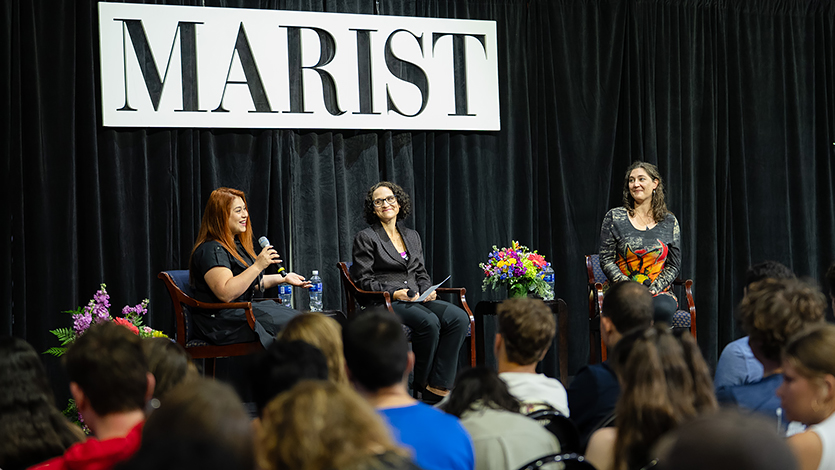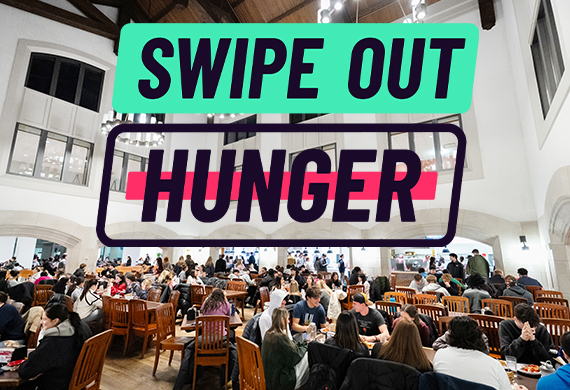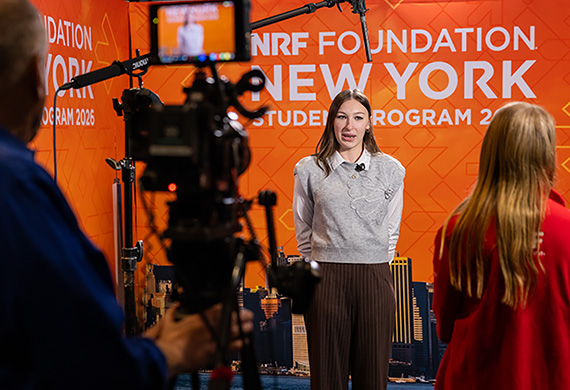Common Read ‘Smashes’ Mental Health Stereotypes

From left to right: author Rocky Callen, First Year Seminar Director Dr. Patricia Tarantello, and author Nora Shalaway Carpenter at the Common Read Lecture. Photo by Nelson Echeverria/Marist University.
September 30, 2025 — The McCann Arena served as a center for discussion around important issues relating to mental health challenges facing college students and mental health representation in literature and culture.
Rocky Callen and Nora Shalaway Carpenter, co-editors of Ab(solutely) Normal: Short Stories That Smash Mental Health Stereotypes, spoke to students, faculty, and staff for Marist’s annual Common Read Lecture moderated by Dr. Patricia Tarantello, Director of the First Year Seminar.
The Common Read committee, which includes faculty, staff, and students, selected Ab(solutely) Normal after a months-long review process focused on the theme of mental health and well-being, a topic specifically requested by various campus constituencies, including the Student Government Association.
The themes of the book and lecture demonstrate how literature can serve as a bridge for difficult conversations, with students finding both recognition and hope in the authors' honest approach to mental health storytelling.
“One of the reasons the Common Read Committee favored Carpenter and Callen's book was because it doesn't shy away from the more challenging aspects of mental health but also presents mental health in an overall positive way,” said Dr. Tarantello. “We feel very fortunate that the editors were able to come to talk to the students and were so enthusiastic about drawing attention to the importance of self-care and mental well-being.”
For many students, the lecture provided validation for experiences they’ve had in their own lives.
“When I was reading the book, I related to a couple of stories and I was like, wow, I didn’t think other people felt this way too,” said Jessica Baeckmann '29.
"I think talking about mental health really helps it be more accepted among the general public," said Marissa Benanti '29. "I've had people in my high school tell me 'you don't have anxiety' and 'that just doesn't exist,' so the more we learn about it, the more that it can be common, that it can be seen."
Students pack the McCann Arena for the Common Read Lecture. Photo by Nelson Echeverria/Marist University.
Emphasizing Authenticity
The starting point for the anthology was an email exchange between Carpenter and Callen, whose debut novels were published within a month of each other in 2020. Both authors recognized a gap in authentic mental health representation in young adult literature.
“We created and curated the stories the way we did because we wanted to make sure that anyone who was experiencing these issues felt like they had a home and that they had a safe space within the book’s pages,” said Callen.
The editors said that the selection process emphasized authenticity through lived experience. They required that contributing authors have personal experience with the mental health conditions depicted in their stories.
This decision aimed to counter what the authors see as frequent misrepresentation in media.
"I think there's a lot of negative stereotypes perpetuated in the media constantly," said Carpenter. "It can often be a source of laughter, especially with OCD, and that's just not true to a lot of people's experiences and we wanted people to feel seen and show them that they matter."
Rocky Callen (left) and Nora Shalaway Carpenter (right) at the Common Read event. Photos by Nelson Echeverria/Marist University.
Mental Health in the Digital Era
The discussion addressed contemporary factors affecting student mental health, particularly social media's role in creating unrealistic comparisons. The authors described this dynamic as people comparing "your inner self with other people's outer selves," a phrase that resonated with several students in attendance.
“I’ve just never really heard it described that way before and I thought it was really interesting,” said Darian Greenbaum '29.
The authors also discussed how high-achieving environments like being in college can present particular challenges, with perfectionism and academic pressure potentially increasing vulnerability to mental health issues.
“I really think that the time we live in, with our multi-crises, such as the ecological crisis that we’re in, and just the world crises that are happening everywhere, our political meltdown — that’s bad for everyone’s mental health,” said Carpenter.
Photo by Nelson Echeverria/Marist University.
Finding Hope in New Ways
The concept of resilient hope resonated with students. Callen's idea that "hope has teeth," requiring "grit and strength and resilience and tenacity," struck Marissa Benanti '29 as especially meaningful.
"I've always heard the idea that 'hope has wings,' but the fact that they said hope has teeth makes it more raw in a way," she said.
Both speakers discussed their own relationships with mental health openly during the talk. They acknowledged that it took years before they were comfortable discussing these experiences publicly.
“I really liked it when they talked about their experiences as an adult,” said Sara Buncey '26, a psychology major. “It was nice to see that people are still learning, and that you can still be figuring things out once you’re an adult.”
“The Common Read Event is such an important touchstone for our first-year students as they get to come together and have a very meaningful experience anchored to a book they've all read over the summer,” said Dr. Tarantello. “Carpenter and Callen's dynamic talk on mental health and well-being highlighted Marist University's commitment to academic vibrancy, student centrality, and expansive community.”
Marketing and Communication student workers Cira Shaw '26 and Lauretta Russell '26 contributed to this article.



